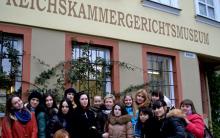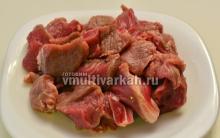1. Nouns belong to one of three childbirth: male, female, average.
The gender of a noun can be determined by agreeing with it the possessive pronoun my:
my son, my governor, my curtain, my little house - masculine;
my wife, my wall, my night - feminine,
my window, my sky, my animal - neuter gender.
In addition, for most nouns denoting people, gender can be determined by gender - my apprentice, my grandfather(masculine); my mother, my sister(feminine gender).
2. Genus unchangeable nouns is defined as follows.
The gender of uninflected nouns that name people is determined by gender.
Brave hidalgo, refined lady.
Nouns denoting professions and occupations are masculine.
Military attaché, night porter.
Unchangeable nouns that name animals are masculine, although when referring to a female they can be used as feminine nouns.
Australian kangaroo, funny chimpanzee, little hummingbird.
The chimpanzee was feeding her babies.
Exceptions: tsetse, iwasi- feminine gender.
Unchangeable inanimate nouns are neuter.
Night taxi, delicious stew, new blinds.
Exceptions: coffee, penalty, sirocco(masculine) avenue, salami(feminine gender).
3. A special group consists of nouns general kind, which can refer to both male and female people.
What a slob you are! What a slob you are!
General nouns characterize a person, usually give an evaluative description of a person, have the endings -а, -я and belong to the 1st declension.
A slob, a ringleader, a singer, a hard worker, a dirty guy, a dude, a drunkard, a sissy, a sleepyhead, a crybaby.
Note!
Some 2nd declension nouns with a zero ending, naming persons by profession ( doctor, professor, associate professor, driver etc.), although they can be used in relation to female persons, are still masculine nouns!
4. The gender of nouns is determined by their singular form. If a noun does not have a singular form, it cannot be classified into any of the three genders.
Manger, pasta, trousers, pitchforks.
B) Number of a noun
1. Most nouns have two numbers - the only thing And plural. In the singular form, a noun denotes one object; in the plural form, it denotes several objects.
Pencil - pencils; doctor - doctors.
2. Only one form(singular or plural) have real, collective, abstract and some concrete nouns.
Only the form singular have:
most material nouns;
Oil, cement, sugar, pearls, sour cream, milk.
most abstract nouns;
Joy, goodness, grief, fun, redness, running, gray hair.
most collective nouns;
Teaching, students, foliage, animals, crows, children.
most proper names.
Voronezh, Caucasus, Caspian Sea, Ural.
Note!
In some cases, nouns that have only a singular form can form plural forms. But such education is necessarily associated with a change in the meaning of the word:
1) at real
a) types, varieties of substance:
wine - dessert wines, oil - technical oils;
b) the value of the large space covered by this substance:
water - ocean waters, sand - Karakum sands;
2) at distracted of nouns the plural form has the meaning:
a) various manifestations of qualities, properties, states:
opportunity - new opportunities, joy - our joys;
b) duration, frequency and degree of manifestation of a sign, condition, action:
frost - prolonged frosts, pain - severe pain, scream - screams.
Only the form plural have:
- some collective nouns;
Money, finance, wilds.
some real nouns;
Ink, sawdust, cleaning.
some abstract nouns;
Name days, elections, attacks, intrigues, beatings.
some proper names;
Karakum, Carpathians, novel “Demons”.
words denoting paired objects, that is, objects consisting of two parts;
Glasses, trousers, sleigh, gates, scissors, pliers.
some names of periods of time.
Twilight, day, weekdays, holidays.
Note!
For nouns that only have a plural form, not only the gender, but also the declension is not determined!
C) Case and declension of nouns
1. There are six in Russian cases:
All cases except the nominative are called indirect.
Note!
1) To correctly determine the case of a noun, you need to find the word on which the noun depends and ask a question about the noun from this word, and it is better to use both questions at the same time.
Wed: He trusted his friend: he believed[to whom? what?] friend - D. p.
The form I. p. usually has a subject, and such a noun does not depend on other members of the sentence, but is connected with the predicate.
Wed: I have[Who? what?] friend - I. p.
2) It is especially important to ask both questions if the noun is in the nominative, genitive or accusative case, since animate nouns have the same questions in the genitive and accusative cases (who?), and inanimate nouns have the same questions in the nominative and accusative cases (what?).
3) If a noun has a preposition, then the question must be asked using this preposition.
Wed: He looked at the book: he looked[in whom? into what?] in the book.
4) A preposition can be separated from a noun by an adjective or pronoun. Note that a preposition is associated with a noun, not a noun-dependent modifier.
Wed: He was quarreling with his friend: quarreling[with whom? with what?] with a friend.
2. Changing nouns by case and number is called declination.
Immutable nouns ( coat, citro, metro, taxi, kangaroo, UN, traffic police) have no declination! Their number and case can be determined in phrases and sentences on the question.
He was sitting[in whom? what?] V coat - singular, prepositional case; He came[without whom? without which?] without coat - singular, genitive case.
3. The declension of modified nouns is determined by the form nominative singular. Most singular nouns are divided into three types of declension.
The type of declension is determined by the initial form (singular, nominative case):
| 1st class | -and I | Feminine, masculine and common nouns with endings -а, -я. | Spring, earth, line, uncle, ruler, dirty one. |
| 2nd class | zero | Masculine nouns ending in zero. | House□ , edge□ , ball□ , planetarium□ . |
| -o, -e | All nouns end in -o, -e. | Window, field, suspicion- neuter gender; wolf, apprentice- masculine. | |
| 3rd class | zero | Feminine nouns ending in zero. | Mother□ , daughter□ , night□ , steppe□ . |
4. Ten neuter nouns ending in -мя (ending -я): time, burden, stirrup, tribe, flame, banner, crown, seed, name, udder, as well as nouns way, child refer to divergent(they have endings of different declensions).
5. The noun person has different roots in the singular and plural ( person people), therefore has different types of declension in singular and plural:
person (singular) - declined as a 2nd declension noun;
people (plural) - declined as a 3rd declension noun.
6. Substantive adjectives and participles (nouns formed by moving from one part of speech to another: ice cream, dining room, living room, maid etc.) do not belong to any of the three types of declension. They continue to decline, just as adjectives and participles decline!
D) Declension patterns for nouns
1st declension
| Case | Singular | Plural | ||||
|---|---|---|---|---|---|---|
| I. p. | Mother | Nanny | Aria | Moms | Nannies | Arias |
| R. p. | Moms | Nannies | Arias | Mom | Nian | Arius |
| D. p. | To mom | Nanny | Arias | Moms | Nannies | Ariam |
| V. p. | Mom | Nanny | Aria | Mom | Nian | Arias |
| etc. | Mom | Nanny(s) | Aria(s) | By moms | Nannies | Arias |
| P. p. | About mom | About the nanny | About the aria | About moms | About nannies | About arias |
Note!
Nouns of the 1st declension ending in -iya: army, aria, symphony, Maria and others - in the dative case and prepositional case of the singular they have the ending -i, like nouns of the 3rd declension.
Wed: to the army, about the aria, to the symphony, about the symphony, to Mary, about Mary.
For nouns ending in -ya: Marya, liar, cell
Wed: to Marya, oh Marya.
2nd declension. Masculine
| Case | Singular | Plural | ||||
|---|---|---|---|---|---|---|
| I. p. | House | Horse | Cue | At home | Horses | cues |
| R. p. | At home | Horse | Kiya | Houses | Horses | Kyiv |
| D. p. | Home | horse | Kiyu | Home | Horses | Kiyam |
| V. p. | House | Horse | Cue | At home | Horses | cues |
| etc. | Home | Horse | cue | Homes | Horses | Kiyami |
| P. p. | About the house | About the horse | About the cue | About houses | About horses | About cues |
Note!
Nouns of the 2nd declension ending in -iy (zero ending): cue, radium, proletarian, planetarium and others - in the single prepositional case they have the ending -i, like nouns of the 3rd declension.
Wed: about radium, about the planetarium.
For nouns ending in -ey, -ai (zero ending): edge, sparrow etc. - this rule does not apply (!).
Wed: about the edge, about the sparrow.
2nd declension. Neuter gender
Indeclinable nouns
| Case | Singular | Plural | ||
|---|---|---|---|---|
| I. p. | Time | Path | Time | Paths |
| R. p. | Time | Paths | Times | Ways |
| D. p. | Time | Paths | From time to time | Ways |
| V. p. | Time | Path | Time | Paths |
| etc. | Time | By | From time to time | In ways |
| P. p. | About the time | About the path | About times | About the paths |
Note!
In indirect cases, nouns ending in -mya have the suffix -en- ( time, seed, name).
Exception form the plural forms of the genitive case of nouns seed, stirrup - no seeds, no stirrups.
This group includes nouns that are used only in the plural form (pluralia tantum): holidays, ink, perfume, sleigh.Category of number of nouns.
Categories of numbers is a lexical-grammatical, inflectional category that expresses the relationship of a noun to the number of objects it denotes: person - people, house - houses, table - tables.
The main means of expressing a number is ending noun. Most nouns end in -and(s)), which is a specialized plural morpheme. Ending -and(s) nouns have masculine, feminine, neuter gender (pencils (m.r.), books (f.r.), ears (m.r.). Middle nouns R. and a large group of nouns husband. genders have an ending -and I): windows, seas, fields, shores, cities. A small and unproductive group of masculine nouns has the ending -e:peasants, Russians, Kyivians, citizens.
In indeclinable nouns, the meaning of number is expressed syntactically, the form of words consistent with it: beautiful coat - beautiful coats.
1. Nouns having forms of both numbers (book - books).
2. Nouns that have only a singular form (singularia tantum): millet, courage, foliage.
3. Nouns that have only a plural form (pluralia tantum) wilds, money, perfume.
4. Nouns with a syntactically expressed meaning of number (specific indeclinable nouns) I bright muffler - bright mufflers.
In different styles of speech, forms of one number can be used to mean another number. Thus, the singular number can be used instead of the plural:
1) when designating the most important features of an entire class:
A student is an inventive creature, an elephant is a smart animal
2) when using a specific noun in a collective meaning:
And you could hear how the Frenchman rejoiced until dawn
3) when indicating that identical objects belong to each person:
The whole class raised their hands. Everyone stood with their heads down.
The use of singular forms in the meaning of a generalized set is currently typical for the names of holidays: Teacher's Day, Border Guard Day; for names of stores, businesses: store “ Pen", factory " Stroydetal".
The plural is used instead of the singular:
1) when indicating different grades or types of substance: cheeses, sausages of different varieties;
2) when designating wide spaces occupied by something: forests all around;
3) when indicating kinship, typicality: Titov family, Plyushkins;
4) when denoting a specific manifestation of abstract concepts: the beauty of nature, the first joys;
5) when designating repeating the same natural phenomena:
Winters in the south are warm and it rains every autumn.
6) in expressive speech, expressing shades of disapproving indifference:
You travel around different Arctic regions and the Balkans.
→Nouns: gender and number
Gender and number of nouns
Genus: There are three genders in the Russian language: masculine, feminine and neuter. Each noun belongs to one of these genders: father, boy, pee A body, wolf, oak, house- masculine nouns; mother, girl, piss A calf, fox, pine, school O la- feminine nouns; animal, tree, wing, field, building, feeling- neuter nouns.
For animate nouns, gender has a real meaning, indicating that they belong to the male or female gender. For inanimate nouns, there is no connection between the meaning of the noun and its gender (even nouns belonging to the same thematic group can have different genders: for example, in the names of the days of the week, the nouns Monday, Tuesday, Thursday- male, Wednesday A, Friday, Saturday O that- female, Sunday- neuter). Thus, for most nouns, gender is grammatical in nature and is determined by a formal feature - by endings in the nominative singular. Nouns used only in the plural have no gender (for example: spirit And, holidays, day).
Masculine gender includes nouns ending:
a) to a hard consonant - house, table, world, city, view;
b) to a soft consonant (including And) - nail, fire, January, stream, hero;
c) on w, w, h, sch(without a soft sign) - knife, pencil, key, cloak.
Some masculine nouns, denoting male persons, as well as proper names for men (usually diminutives), have the ending - and I (man, young man, uncle, Borya, Vanya, Sasha, Nikita).
The feminine gender includes nouns ending:
a) on -a, -i, -iya — country, land, party;
b) for a soft consonant - spruce, bed, area;
c) on w, w, h, sch(with a soft sign) - rye, mouse, night, speech, help.
The neuter gender includes nouns ending:
a) on -o, -e, -e, -ie - window, sea, towel, gun, skill;
b) on -me — vr e me,And me, banner, flame.
In this way, neuter nouns are most easily distinguished. Masculine and feminine nouns have partially overlapping forms of the nominative case (on a soft consonant, on w, w, h, sch); It is best to memorize their gender in accordance with the instructions in the dictionary.
We can name only a few auxiliary methods of determining the genus:
- masculine and feminine nouns w, w, h, sch, identical in pronunciation, differ in writing by the presence of a soft sign after the final consonant in feminine nouns and in its absence in masculine nouns ( rye is a knife, night is a ball);
- all animate nouns with a suffix -tel- male ( writer, reader);
- all inanimate nouns with a suffix -ness- female ( youth,
nationality, independence).
Morphologically, the gender of nouns is manifested in case endings, syntactically - in the form of agreement with adjectives, pronouns, participles, as well as verbs in the past tense, cf.: after e daysthe day, the day has passed(m.), last autumn, autumn has passed(and.), after e It's summer, summer is gone(cf.).
Number: Nouns have two numbers: singular and plural ( book - books, table - tables, teacher - teachers).
Only in the singular some nouns are used to denote substances, materials ( milk, salt, gold), abstract concepts (studying, walking,presence, courage), names of some plants ( potatoes, carrots, onions, strawberries), names of countries of the world, as well as proper names (south, from e ver, Moscow, Volga, Caucasus, France,Warsaw).
Only in plural nouns are used that denote so-called paired or composite objects (trousers, gate, scissors, glasses), names of some substances ( perfume, cream, ink).
- ← Gender and number of nouns→
Gender is a lexico-grammatical category of nouns, syntactically independent, expressing the relationship of the noun to one of three genders.
There are three genders in modern Russian: masculine, feminine, neuter.
All nouns (except for words like sleigh, gate, ink, which do not have singular forms) are divided into genders: air (m. r.), earth (f. r.), sky (w. r.).
The category of gender has different content for inanimate and animate nouns.
For animate nouns, gender is motivated and reflects the difference in biological sex (old man - old woman, man - woman).
The gender of inanimate nouns is unmotivated; the distribution of such nouns by gender is based on formal characteristics (for example, the word country with inflection -a belongs to the feminine gender; the words selo, field with inflections -o, -e belong to the neuter gender; the word table with zero inflection and hard final consonant of the base belongs to the masculine gender).
In terms of gender, animate and inanimate nouns have similarities and differences.
The differences are as follows:
- Animate nouns can be masculine or feminine, which is determined by their semantics; Inanimate nouns belong to one of three genders - masculine, feminine, neuter.
- Animate nouns in some cases form gender pairs: student - student; father mother; teacher - teacher. Inanimate nouns do not have such pairs.
To express generic meanings, means of various levels are used: morphological, lexical, word-formation, syntactic.
Since the category of gender is a morphological category, the main means of expressing gender differences are the actual morphological means - endings.
Each genus has its own system of endings. Wed: "os(Shch, nose\Sh, nose\y\, "osP, nose\osh. about nose\e](m. r.); golovShch, head-head. head\e\, golovShch, head \oh\, about head\e\(f. r.);
However, there are exceptions. Thus, the ending -a in the nominative case of the singular has not only feminine words, but also some categories of masculine nouns (voivode, young man), the ending -o, typical of neuter words, also has masculine nouns (umishko, hlebushko, little voice, etc.).
The lexical expression of the gender category is presented in some names of people and animals: father - mother, brother - sister, bull - cow, etc.
Derivative means are also used only in the names of people and animals: teacher - teacher, Komsomolets - KomsomolKSh, elephant - slonikSh, lion - L'vitsShn, etc.
Syntactic means (forms of agreement) are most often used along with morphological means (endings): big house, big school, big room; my table, my hat, my pen; the maple grew, the birch grew, the tree grew. With unchangeable words, the endings of words consistent with them act as the only indicators of gender: a beautiful muffler, an expensive coat, the maestro stood up, the kangaroo jumped, our Betsy, delicious coffee, sunny Tbilisi, etc.
Only with the help of agreement forms is gender expressed in nouns such as (small) house, (tall) young man, (such) braggart, slob (cf. such a slob, such a slob).
Words of general gender are a purely conventional name for one of the groups of nouns with the meaning of person.
Words of the general gender can have the meaning of both masculine and feminine, depending on the gender of the person they denote: “Now, master, look at Lyubka,” Vosmerkin continued. “This is our first female singer” (A. Chekhov); He needs to retain the glory of a good lead singer (m. r.) (M. Gorky).
This category of nouns is unique, since the gender of a person is expressed syntactically - by different agreement of defining words with the same noun; a complete ignorant - a complete ignoramus, so smart - so smart.
Words of the general gender designate a person according to his characteristic action or property, while expressing an emotional assessment, often disapproving: couch potato, crybaby, suck-up, greedy, mean, quiet, etc.
Words of general gender are divided into two categories:
- proper indeclinable nouns are foreign language surnames with a vowel: Benui, Gyugd, Corbusier, as well as native Russian surnames such as Blagov o, Teplykh, Shevchenko, Milykh;
- common nouns and proper inflected nouns in -а/-я, characteristic of oral speech:
b) various common nouns that give a qualitative definition of a person: grump, crook, ignorant, idle talker.
Masculine nouns with -а/-я should be distinguished from common gender nouns. For example, the words bouncer, thug, boss, scribbler, rake, undressed masculine.
Nouns such as doctor, geologist, director, engineer can equally be used to name male and female persons, while remaining masculine nouns.
If such a noun names a woman, then the definition for it is consistent in the masculine gender, and the predicate - in the feminine: The young doctor (M.R.) Ivanova sat all night at the bedside of the victim.
Feminine words (snake, fox, puppet, teterya, etc.) can be used as characteristics of male persons with a disapproving connotation: This Petrov is such a hat!
Declined nouns are divided into genders taking into account their morphological characteristics. Only individual words and groups of words belong to one gender or another in meaning. -
The masculine gender includes:
- according to morphological characteristics:
b) all nouns with a stem in zh, sh and a soft consonant that have the ending -а/-я in the genitive case of the singular: baggage (luggage), kamysh (reed), horse (horse), day (day), etc. .;
- by value:
b) words with magnifying suffixes -in(a), -ishch(e), formed on the basis of masculine nouns: domina, domische (cf. house), tomische (cf. volume), boot (cf. boot), etc. P.;
c) nouns with derogatory and diminutive suffixes: -shik(o), -ushk(o), -ishk(a), formed on the basis of masculine words: domishkSh (cf. domGA), hlebushkSh (cf. bread\AA), liar (cf. liar\AA), sonyshkSh (cf. son), etc.;
d) the word journeyman (m.r.);
e) the word path (m.r.).
According to morphological characteristics, the feminine gender includes:
- nouns ending -а/-я in the nominative singular: road, brigade, sister, etc. (except for the words servant, youth (m.r.), etc., words with the augmentative suffix -in( a) (domina), differently inflected nouns ending in -mya (crown, udder (wed. r.)) and the words child (wed. r.);
- nouns with a base on a soft consonant (except for the word path) and on zh, sh, having the ending -i in the genitive case singular: zyaby (zyabi), branch (branches), overcoat (overcoats), rye (rye), carcass (carcasses) ).
- nouns ending -о/-е in the nominative singular case: glass, linen, field, etc.; except for masculine nouns with the suffixes -ishk(o), -ushk(o), -ish(e) and the masculine noun journeyman;
- indeclinable nouns in -name: time, name, tribe, seed, udder, crown, burden, banner, stirrup, flame;
- word child.
The masculine gender includes:
- nouns denoting male persons: maestro, monsieur, bourgeois, attaché, etc.;
- names of animals (except the word tsetse): wildebeest, flamingo, chimpanzee, pony, etc.;
- names of winds (influenced by the generic concept of “wind”): pampero, sirocco, tornado, etc.;
- names of languages: Hindi, Swahili, Fiji;
- individual nouns of different thematic groups: coffee, penalty, suluguni (cheese), ecu (an ancient French coin), etc.
- nouns denoting female persons: Frau, lady, madam, lady, etc.;
- words tsetse (a type of fly), salami (sausage), iwasi (a type of herring), avenue (a wide street in France, England, USA), kohlrabi (cabbage).
The gender of indeclinable geographical names is determined by the gender of the nouns naming the generic concept. Thus, the word Hokkaido is masculine, as it relates to the word island; Tbilisi, Tuapse, Delhi masculine (cf. city), Mississippi, Colorado, Po feminine (cf. river); Morocco, Congo, Chile neuter (cf. state). The names of newspapers and magazines are distributed according to the same principle: the evening “Humanité”, the French “Nouvelle Observer”.
The gender of compound abbreviated words is determined by the gender of the reference word of the phrase on the basis of which these abbreviations are formed: MGU (Moscow State University - m. r.), TSB (Great Soviet Encyclopedia - zh. r.), RONO (district department of public education - m. R.).
The gender of compound nouns such as raincoat, double canoe, conference room, etc. depends on the inflection of the parts of the compound name. If the first word is not inflected, the gender is determined by the inflected word: alpha radiation (s.r.), ampere-second (f.r.), defo device (m.r.). If two words are declined, the gender of the compound name is determined by the gender of the first word: boarding school (f.r.), sofa-bed (m.r.), launch vehicle (f.r.). A small group of words have two generic forms - most often the endings are masculine and feminine. Wed: shutter - shutter, burr - burr.
Gender variation of nouns is on the decline. As a result of competition, one of the forms is forced out of the language. Therefore, most variant forms of the genus are unequal. Wed: giraffe - giraffe (less often); burr - hangnail (less often); shampoo, -I - shampoo, -i (colloquial); rail - rail (simple); apricot - apricot (simple); parcel, -i - parcel, -i (simple); beans, -i - beans, -ya (obsolete), etc.
Stylistically undifferentiated variants occupy an insignificant place in the system of nouns of the modern Russian language. According to dictionaries, these include: shutter - shutter; spasm - spasm; lobster - lobster; sprat - sprat; salmon, -I - salmon, -and; muskrat, -I am a muskrat, -i.
Gender of nouns
1. What is the gender system of nouns in the Russian language?
All Russian nouns in the form singular it is possible to assign it to one of the following genera: male, female, average, general.
2. How to find the gender of a noun?
It is possible to find the gender of a noun by matching the pronoun with it my:
my son, my governor, my curtain, my little house- masculine;
my wife, my wall, my night- feminine gender,
my window, my sky, my animal- neuter gender.
Almost all nouns denoting people have a gender that can be found by gender: my apprentice, my grandfather(masculine); my mom, my sister(female gender).
3. What nouns have common gender?
4. How to find a genus immutable nouns?
Unchangeable nouns that call animals, belong to the masculine gender, although when indicating a female they can be used as feminine nouns: Australian kangaroo, funny chimpanzee; chimpanzee feeding her own babies. Exceptions: tsetse(fly), Ivasi(fish) - feminine.
5. How to find the gender of compound words (abbreviations)?
6. How to find the gender of nouns ending in -Л in the form im. P.(class words tulle, callus, polish, roofing felt, valve)?
7. How to find the gender of nouns denotingnames of shoes and paired items?
Boots - one shoe
Bots - one bot
Over the knee boots - one over the knee boot
Sneakers - one sneaker
Slates - one slate
Moccasins - one moccasin
Sandals - one sandal
Shoes - one shoe
Sandals - one sandal
Slippers - one slipper
Sneakers - one sneaker
Boots - one boot
Shoe covers - one shoe cover
Vietnamese - one Vietnamese
8. How to find the gender of compound nouns(class words cafe-dining room, sofa bed)?
9. Do nouns change by gender?
Exercises for the topic "Gender of nouns»
Exercise 1. Determine the gender of the nouns.
Spouse, child, book, poor fellow, orphan, angry, time, grandfather, warrior, roe deer, elephant, toad, shark, quiet, stirrup, stepmother, Betsy, bourgeois, name, seed, creature, little house, coat, nonentity, cocoa, coffee, window, deity, animal, monster, pants, sirocco, depot, porter, entertainer, goose, scissors, gander, goose, parent, doctor, director, letter, apprentice, horse, stallion, voice, bone, guest, knife, trembling, taxi, pitchfork, avenue, piano, shampoo, diagonal, tulle, veil, blinds, pasta, manger, talk, attacks, stretchers, watches, rags, animals, honey, porcelain, velvet, hemp, money, day, holidays, funeral, sweet tooth, sissy, ringleader, smart girl, reveler, crybaby, domina, living room, dining room, bathroom, maid, ice cream, roast, sleigh.
Exercise 2. In which series is the gender of all nouns determined correctly?
1) little house - m.r., bully - general r., shampoo - m.r., radio - average r.;
2) porter - sr.r., trifle - zh.r., flame - m.r., kiwi - m.r.;
3) mischievous - general r., Divide - middle r., escape - m.r., distance - female r.;
4) glaze - zh.r., Sukhikh - m.r., manto - m.r., kakadu - general r.
Additionally:
Source of material Internet site
Additionally on the site:












Why do you dream of blood from the mouth and
Wearing a dress according to the dream book
Territory of the spread of Buddhism What is now in the country of Buddhism
Tao - what is it? Tao Te Ching: teaching. The Way of Tao. Biography of Lao Tzu and the main ideas of the treatise “Tao Te Ching Taoism and Love
Fundamentals of anthropology with elements of human genetics